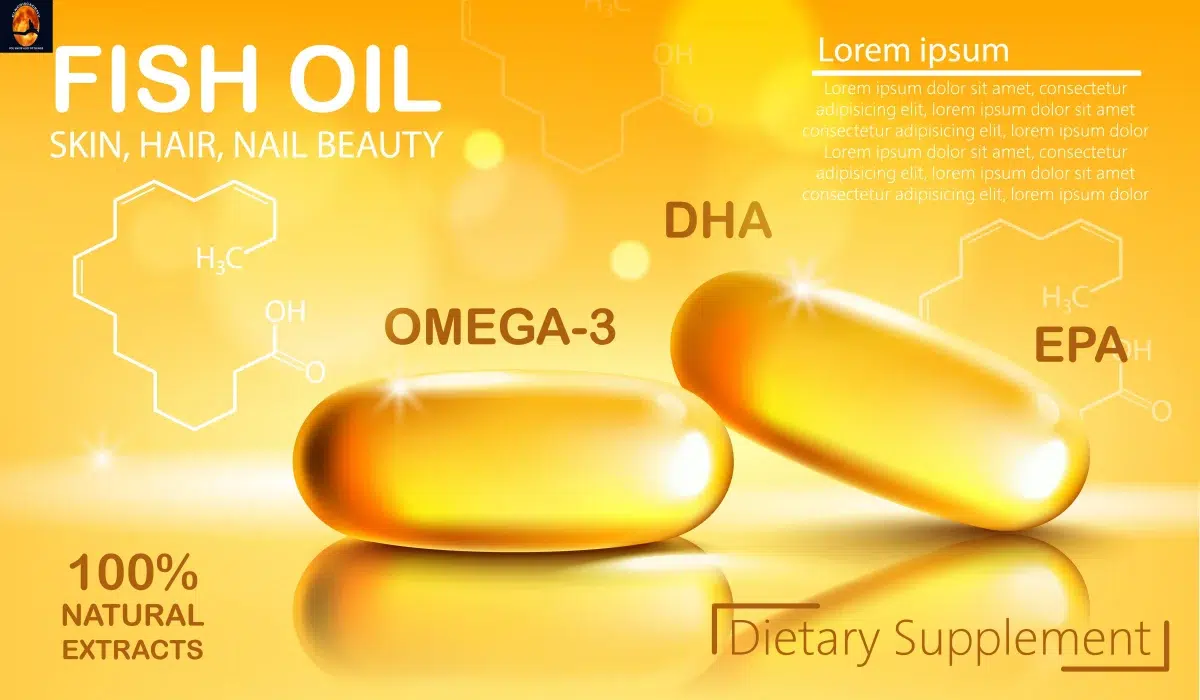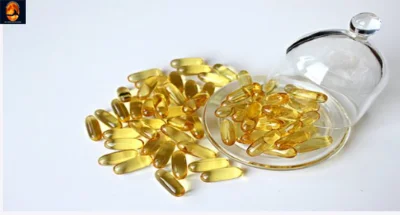What Are Omega-3Fatty Acids?
Omega-3 are nutrients you can get through food or supplements that support the growth and upkeep of a healthy body. They are essential to the composition of each cell wall you have. They also serve as an energy source and support the functioning of your immune system, heart, lungs, and blood vessels.
Although the human body can manufacture most types of fat; However, it cannot manufacture omega-3, but gets it from its food sources.
Types of Omega-3
Omega is available in three main types, namely:
Alpha-linolenic acid: is known short as ALA, which is available in some types of seeds and vegetable oils, besides animals that feed on plants, the human body uses it to get energy, and it should be noted that this Acid is the most common type in Western diets.
Eicosapentaenoic acid, or EPA, is mainly found in fish.
Docosahexaenoic acid: Docosahexaenoic acid, or DHA for short, is mainly found in fish.
Omega-3 benefits
Benefits of alpha-linolenic acid by effectiveness
Alpha-linolenic acid provides many health benefits to the body, but its effectiveness varies from one benefit to another, and the following is a detail of that:
Possibly Effective
Reducing atherosclerosis: In a study published in the journal Circulation in 2005, it was found that the intake of alpha-linolenic acid from its dietary sources contributed to the reduction of coronary artery sclerosis, in male and female studies participants, and in another observational study.
Published by the European Heart Journal in 2019, we found that the consumption of this acid from its natural sources found in food reduces the risk of atherosclerosis in people who do not eat enough animal sources of omega-3, such as fish.
Reducing the risk of heart disease: A 2014 review published by Advances in Nutrition confirmed that an increased intake of alpha-linolenic acid from its food sources reduces the risk of cardiovascular disease, or CVD, although it has also been shown that More studies need to be done to reveal the recommended amount to reduce this risk there is no information showing the role of alpha-linolenic acid supplementation in providing this health benefit.
Reducing the risk of high blood pressure: The results of studies differ on the effect of omega-3 on the level of blood pressure, as some found that this acid may contribute to lowering blood pressure
While other studies did not find this effect for it; For example, the Journal of Oleo Science reported in a small study published in 2007 that alpha-linolenic acid had antihypertensive effects in a group of patients with pre-hypertensive conditions and in cases of slight elevation.
In the level of blood pressure and those who consumed food sources of this acid, the study lasted for 12 weeks; We observed no side effects in the taking part patients.
In 2017, the International Journal of Preventive Medicine published a systematic review of nine studies, most of which found that acid supplementation did not show an effect on high blood pressure, and showed that more research is needed to verify the results
Reducing the risk of pneumonia: or pneumonia, as the consumption of alpha-linolenic acid from a diet high in its sources may reduce the risk of developing this disease, however, there is still a need for more studies on this benefit.
There is insufficient evidence for its effectiveness
Reducing the risk of respiratory infection in children: according to preliminary clinical research; It stated that the use of alpha-linolenic acid in combination with linoleic acid may reduce the incidence of respiratory infections in children.
Reducing the risk of diabetes: In fact, the results of studies on the effect of alpha-linolenic acid in diabetes are still conflicting and unclear. A systematic review published in the British Journal of Nutrition in 2012 showed that consumption of alpha-linolenic acid from plant sources may reduce the risk of developing type 2 diabetes.
Medicine published in 2017 that a diet rich in alpha-linolenic acid does not affect cumulative glucose, fasting glucose, and fasting insulin levels, and we need more research to investigate the effect of the acid on blood sugar levels.
Reducing the risk of migraine: or migraine headaches, 2002 the Journal of Cephalalgia published a 6-month preliminary study, and included 168 patients, and the results reported that the consumption of alpha-linolenic acid, along with other elements of polyunsaturated fatty acids Saturated fats can contribute to easing the severity of the migraine attack, the frequency of its infection, besides the duration of its occurrence. It limits some of its symptoms; such as nausea, vomiting
Other benefits of Omega-3:

There is not enough evidence for the effect of alpha-linolenic acid in some other conditions, such as
- Maintain kidney health.
- Alleviation of Crohn’s disease.
- Reducing hypercholesterolemia.
- Alleviation of depression.
- Reducing the risk of multiple sclerosis.
- Reducing rheumatoid arthritis.
- Improvement of systemic lupus erythematosus, or systemic lupus erythematosus.
Eicosapentaenoic acid benefits according to the effectiveness
Eicosapentaenoic acid offers many health benefits to the human body, but its effectiveness varies from one benefit to another:
Effective
Reducing triglyceride levels in the blood: In 2019, the journal Circulation published a study showing the effectiveness of eicosapentaenoic acid in safely reducing triglyceride levels in the blood, and it can also contribute to enhancing the effectiveness of lipid-lowering agents.
Possibly Effective
Reducing the risk of heart disease: According to the study published in the journal Circulation in 2019; showed that the consumption of Eicosapentaenoic acid in patients with hypertriglyceridemia reduces their risk of cardiovascular disease; Like atherosclerosis.
In 2017, the Journal of Cardiology published a study that included 193 patients with ischemic heart disease, or coronary heart disease, known as CHD, where the results showed that the consumption of Eicosapentaenoic acid to The side of a cholesterol-lowering drug reduces the amount of plaque buildup in the heart, and is thought to reduce the risk of developing it.
Reducing the risk of heart attack: Preliminary research, such as a study published in the International Journal of Cardiology in 2017, revealed that taking EPA, along with a cholesterol-lowering drug, by people suffering from a heart attack reduces the risk of developing arrhythmias. Arrhythmia can occur after patients undergo cardiac arrest by percutaneous coronary intervention.
Its consumption by patients with chest pain after this procedure reduces the risk of cardiac arrest, we should also note the consumption of this acid by people who have a history of cardiac arrhythmia.
It may increase their irregular heartbeat, and therefore it is recommended to consult a specialist before consuming for patients with this disorder.
Reducing symptoms associated with borderline personality disorder: In 2003, the American Journal of Psychiatry published a preliminary 8-week study, in which 30 women took part, during which it was found that the consumption of Eicosapentaenoic acid may safely reduce the symptoms of borderline personality disorder in women to a small degree.
Reducing symptoms associated with depression: The results about the effect of eicosapentaenoic acid consumption in reducing symptoms of depression are conflicting, as some research shows that it may relieve it.
While some other studies did not find these results, for example in a study published in the Journal of Clinical Psychiatry in 2011 we showed that supplementation with this acid relieves depression in its initial stages.
Another study published by the same journal in 2015 showed that this acid does not contribute to improving cases of major depressive disorder. That persists for two weeks without knowing the cause of its occurrence.
Reducing hot flashes that affect postmenopausal women: According to a study published by Menopause in 2009, 120 women suffering from hot flashes took part, and a group of them consumed eicosapentaenoic acid for 8 weeks, and the results showed a decrease in the frequency of flashes.
And intensity, compared to the other group that did not consume it, but it should be noted that more studies are still needed to confirm this benefit.
There is insufficient evidence for its effectiveness
Improvement of cognitive symptoms associated with ADHD: In 2019, Translational Psychiatry published a 12-week study, which included 92 children and adolescents with ADHD, a group of whom consumed eicosapentaenoic acid, and the results showed an improvement in the participants’ symptoms Especially if their levels of this acid were lower compared to the other group that did not take it.
Reducing unintended weight loss in patients receiving chemotherapy: In 2011, the Journal of the American Cancer Society published a preliminary study showing that the consumption of Eicosapentaenoic acid from its food sources maintains the weight of patients receiving chemotherapy, besides They, had muscle mass, and it should be noted that they used fish oil that contains Eicosapentaenoic acid.
Reducing the risk of infection after surgery: According to a review published in the journal Advances in wound care in 2014, we found that the consumption of Eicosapentaenoic acid besides DHA from food sources reduces the risk of infection in the wound areas safely. Healing in case of infection.
Reducing the risk of prostate cancer: In fact, there is still conflicting results from studies about the effect of EPA on prostate cancer.

Some show that it may have an effect in this case, while other studies have not found an effect, and these studies include an observational study published in 2014 in the journal Cancer Prevention Research, during which Eicosapentaenoic acid reduces the risk of prostate cancer.
While other studies have reported that high levels of this acid in the blood do not improve cases of this cancer.
Improvement of symptoms associated with psoriasis: A small study published in the Journal of Clinical Cosmetic and Investigational Dermatology in 2011 and conducted on patients with mild-to-moderate psoriasis showed that omega-3 supplements, including EPA, along with the treatment used In this case, contribute to reducing the Psoriasis Area and Severity Index, or PASI, and the Nail Psoriasis Severity Index NAPSI, besides the NAPSI index.
The quality of the impact of dermatological diseases on the lives of patients, known as DLQI, and some note that it improves the symptoms associated with psoriasis, such as itching, and erythema. (Latin: Erythema) or redness of the skin, infiltration of the treated areas, and crusting of the scalp lesion.
Reducing the exacerbation of ulcerative colitis: In 2018, the Journal of Clinical Gastroenterology and Hepatology published a 6-month study, which included 60 patients with ulcerative colitis.: Fecal calprotectin) without the occurrence of side effects, which shows a reduction in the exacerbation of symptoms in the taking part patients.
Reducing bronchial hyperresponsiveness and pneumonitis: According to a preliminary study conducted on animals and published in Clinical & Experimental Allergy in 2013 on the effect of one of the eicosapentaenoic acid derivatives in lung inflammation and bronchial hyperresponsiveness, in which it was found that it reduces both it is believed, according to the study, that it may reduce the inflammation caused by allergic asthma.
Improvement of symptoms associated with menstruation and their regulation: In 2013, the Iranian Journal of Reproductive Medicine published an 8-week study, in which 78 women with PCOS took part, in which it was found that eicosapentaenoic acid supplements contribute to Regulating the menstrual cycle, reducing testosterone levels without affecting the free androgen index, and sex hormone-binding globulin levels.
Docosahexaenoic acid benefits according to the effectiveness
Docosahexaenoic acid provides the body with many health benefits, but its effectiveness varies from one benefit to
Possibly
Effective Reducing the number of coronary heart disease deaths: In 2006 JAMA published a review that showed that the consumption of DHA from its food sources reduces the number of coronary heart disease deaths.
Improvement in cholesterol levels and lowering triglycerides in the blood: In 2016, the American Journal of Clinical Nutrition published a study on people with abdominal obesity who consumed DHA supplements. High-density lipoprotein, otherwise known as good cholesterol, or HDL.
There is insufficient evidence for its effectiveness
Reducing the risk of age-related macular degeneration: otherwise known as AMD, as eating docosahexaenoic acid during meals reduces the risk of vision loss with age; This is because of its effect on the pigment in the macula in the eye, and we should note that it does not improve the condition of age-related macular degeneration when consumed.
Besides the vitamins and minerals used for this purpose, in an article published in Advances in Nutrition in 2016, we reported that this acid accumulates rapidly in the fetus’s brain and eyes
In the last months of pregnancy and early childhood, it is important for the complete development of the brain and eyes, and thus low levels lead to poor visual functions and cognitive abilities in the child.
Improving the condition of people with atopic dermatitis: or eczema; In 2008, the British Journal of Dermatology published a study in which 53 patients with atopic dermatitis took part.
We found that the consumption of DHA from its food sources can ease this condition, however, there is a need for larger studies to verify these results.
We should note that adding DHA and another fatty acid to infant formula, known as formula feeding, may not prevent the exacerbation of their eczema compared to eating the infant formula alone.
Reducing the risk of developing atrial fibrillation: the results of studies in this area are conflicting; In 2013, the Journal of the American College of Cardiology published a study showing that supplementing with DHA along with EPA and other ingredients may reduce the risk of atrial fibrillation after heart surgery, improve antioxidant levels, and reduce the risk of developing atrial fibrillation.
Oxidative stress and inflammation, reduce the risk of adverse effects that threaten cardiovascular health. In 2013, Heart Journal published an observational study showing no effect of DHA consumption from dietary sources on atrial fibrillation.
Reducing symptoms associated with autism spectrum: where the Journal of Neuroscience published 2018 an animal study showing that autism-related behaviors can be reduced by consuming DHA supplements and that it may reduce symptoms associated with autism, such as changes in The neurotransmitter dopamine,
A 2014 study published in the Journal of Pediatric Gastroenterology and Nutrition on 48 children with autism showed that supplementing with it did not improve the basic symptoms of autism, and it is noteworthy that the reason for this result may be because of the small size of the study sample.
Inhibiting the growth of cancer cells in the breast: According to a laboratory study published in Spandidos publications in 2018, which showed that docosahexaenoic acid stimulates the apoptosis of cancer cells in the breast, and it also raises the levels of antioxidant enzymes.
Reducing the risk of Crohn’s disease: In 2014, the journal Alimentary Pharmacology & Therapeutics published a study that showed a decreased risk of Crohn’s disease with increased consumption of DHA from its food sources.
Reducing the risk of retinopathy in diabetic patients: In a preliminary animal study published in PloS One in 2013, we found that a diet rich in DHA reduces the risk of developing the vascular disease in the retina of patients with type 2 diabetes.
By inhibiting an acid called sphingomyelinase in the retina and vascular progenitor cells which leads to an improvement in the function and number of these cells, besides reducing the risk of retinitis, showing that this acid may raise blood sugar levels in patients with type 2 diabetes.
Reducing the risk of lower respiratory infection: the results of studies differ on this point; Where some preliminary studies have shown that providing infants with an infant formula with added docosahexaenoic acid and other fatty acids reduces the risk of lower respiratory tract infections, such as whooping cough, and bronchitis.
But it is worth warning that we should not give this acid to premature babies who are less than 29 weeks of gestational age; In the seventh month of pregnancy, some research has shown that supplementing with this acid may increase their risk of respiratory problems, and to read more about that, you can refer to the section on the precautions of using docosahexaenoic acid.
Risks of Omega-3 Fatty Acids

Do remember, however, that excessive amounts of omega-3 can raise your risk of bleeding and hemorrhagic stroke. Large doses of omega-3 might raise the risk of certain malignancies, such as prostate cancer.
Summary
Omega-3 fatty acids are a crucial component of a person’s diet and support the fundamental well-being of every cell in the body. Most people consume enough omega-3 fatty acids to achieve this through their diet.
Fish is a major source of omega-3 fatty acids. There is strong evidence that consuming more fish can lower a person’s risk of acquiring cardiovascular diseases. However, there is still insufficient proof to prove that taking omega-3 supplements has comparable health advantages.
FAQ
The omega-3 present in fish oil is thought to: give critical proteins and nutrients to hair follicles and skin, which is why many individuals consume fish or fish oil supplements to encourage hair development and prevent hair loss.





